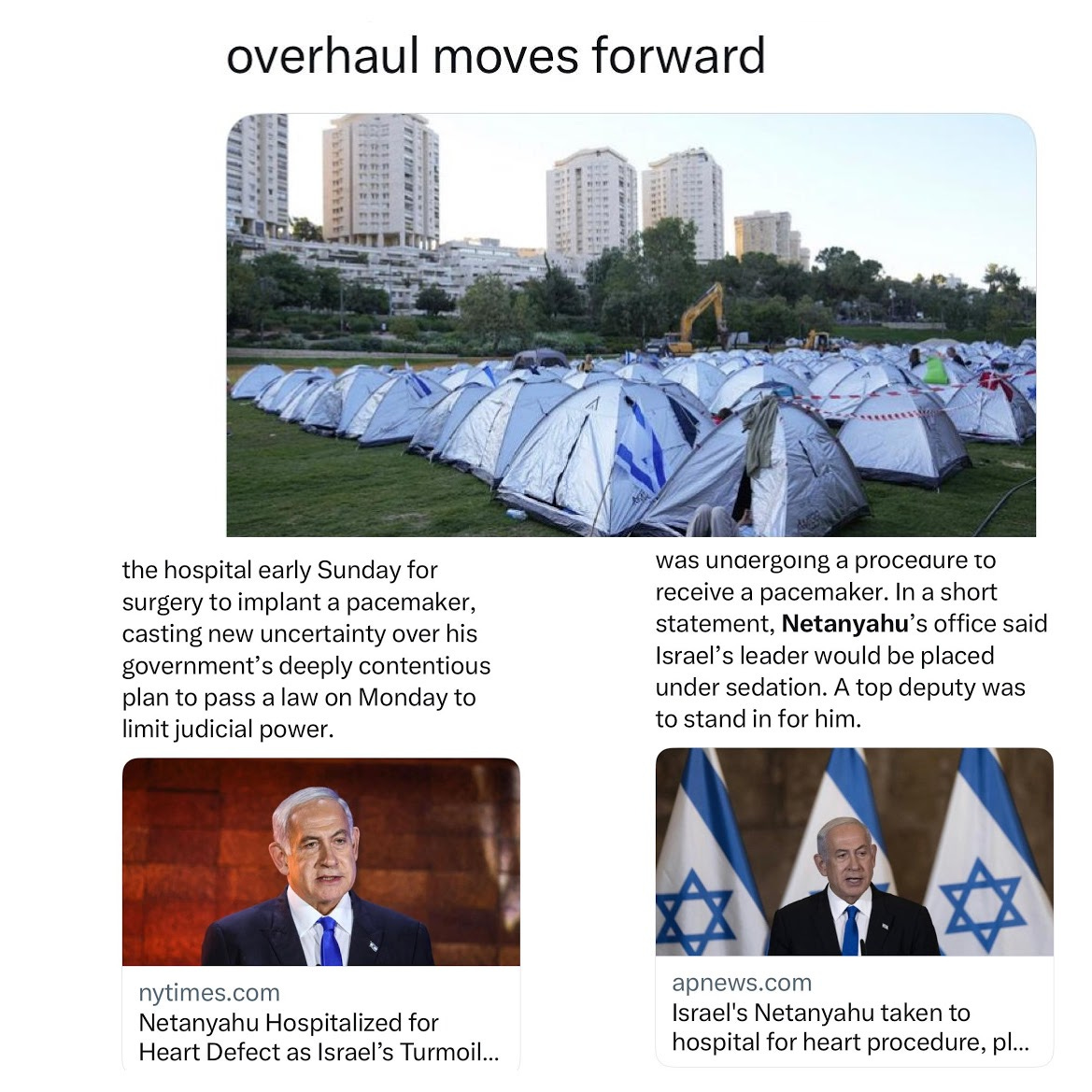First Clause of the Judicial Overhaul Passed: All 64 members of the coalition, including PM Netanyahu, voted and passed the first clause, cancellation of the reasonableness test. All 56 members of the opposition decided at the last moment to leave the hall and not participate in the voting, resulting in 64 votes for the legislation against 0. Prior to the voting there were extended efforts by many, including President Herzog, to reach a compromise. The voting process lasted hours, in order to try and reach a compromise.
The heads of the state security agencies tried to explain the resultant damage to the army if the clause passes. Defense minister, Yoav Galant, almost begged to reach an agreement to calm down the protest from the army reservists. President Biden delivered several messages to PM Netanyahu on the need to pass laws only with a broad consensus. But the extreme factions in the coalition government, namely justice minister Levin, national security minister Ben Gvir and minister of treasury Smotrich, refused to moderate the proposed version of the law.
PM Netanyahu addressed the nation in a live broadcast in which he tried to calm the nation, claiming that he is in charge, and that he is open to begin conversations with the opposition in order to reach an agreement.
Consequent to passing the law, several appeals to the high court of justice were submitted, claiming it is an unconstitutional law. As a result, a delegation of supreme court justices, decided to cut short an official visit to Germany and return to Israel.
Later this week, PM Netanyahu gave interviews in several American media outlets, in which he refused to say if he would abide by any potential Supreme Court ruling regarding those appeals.
Simultaneously, the Protest Against the Legislation Reached a Tipping Point: The four days march from Tel Aviv, reached Jerusalem, where tens of thousands of protestors joined the march, ending in a huge rally in front of the Knesset. Later, thousands of people set up a compound of tents, and many stayed near the Knesset until Monday, voting day for the legislation.
The country was in turmoil for three days. Main roads were blocked, major highways, including Jerusalem and Tel Aviv, were blocked for hours.
After the bill was passed, tens of thousands of people joined demonstrations that became more radical. The police used extreme measures to disperse the road blocks.
The protestors are now considering next steps now that the legislation has passed.
Prior to the voting, right wing supporters, who are in favor of the overhaul legislation, organized a big rally in Tel Aviv, at the same spot where their opponents have demonstrated for more than thirty weeks in a row.
Economic Crisis: Credit rating agency, Moody’s Investors Service warned about “negative consequences” and “significant risk” for Israel’s economy following the passage of the first bill of the judicial overhaul.
In addition: Morgan Stanley cut Israel’s sovereign credit rating to a dislike stance, Citi Bank has cautioned investors about a “constitutional crisis” scenario over legislation approved despite the lack of consensus.
Israel’s economy was considered strong, but since the judicial overhaul process started, there are signs of weakening. Investors are re-considering their financial moves, some high-tech companies have decided to relocate their headquarters outside of Israel.
All experts, Israeli and international, have warned the government about an impending economic crisis, but that did not help sway the process or delay the legislation.
The Israeli stock market has responded with sharp declines.
Ministers and other members of the coalition blame the protests for the economic crisis, claiming they create an unstable situation.
As a response to Moody’s warning, PM Netanyahu and minister of treasury Smotrich have said: that this is only a minor reaction that will change once the dust settles.
PM Netanyahu Fitted with a Pacemaker: a week after he was rushed to hospital after he fainted at his home in Caesarea, PM Netanyahu underwent a procedure under sedation and was fitted with a state-of-the-art mini pacemaker. The physicians who treated him confirmed that PM Netanyahu suffered from irregularities in heart rate, after he was fitted with a subdural halter when he was first hospitalized the prior week. Minister of Justice Yariv Levin served as acting PM while Netanyahu underwent the procedure. Shortly after he recovered from the procedure, PM Netanyahu released a video, stating that he was feeling great and energized.
When Netanyahu was first rushed to hospital, the official statement by his physicians and the PM office was that he was dehydrated, having spent several hours on the beach at the Sea of Galilee. Yet shortly afterwards media correspondents commented that the treatment he received was not consistent with the symptoms of dehydration. Public criticism grew, as more details unfolded, and it was clear that the PM and his physicians withheld information about the PM’s health condition.
Physicians Hold Stirke in Protest against Knesset Vote to Abolish Reasonableness Test: following the decision, Israel’s Medical Associations, physicians and other medical staff went on strike the day following the Knesset vote. According to analysts and public health officials, the judicial overhaul legislation will exacerbate the existing strains on the public health system which is already on the verge of collapse, and risk lives. The strike ended several hours later, after MInister of Health Arbel (Shas party) asked the labor court to issue an injunction ordering the physicians and medical staff to return to work. Leaders of Israel’s Medical Association (IMA)said they disagreed with the court order, but will respect it.
Health and mental health professionals were involved in the protests against the judicial overhaul from the begining, and warned against the ramifications of the legislation on emotional well-being. While the majority of the members of IMA supported the strike, it did result in public criticism, especially from members of the government and coalition, who claimed that the physicians were breaking their oath and commitment to the public.
The media reported that following the strike, more than a thousand physicians joined a new WhatsApp group dedicated to relocation outside of Israel for medical professionals .
For further readings:
Judicial Overhaul: Here, here, here, here, here
Protest: Here, here, here, here, here, here
Economy: Here, here, here, here









Thank you for writing and sharing.